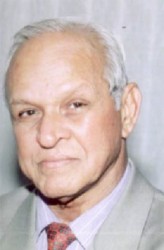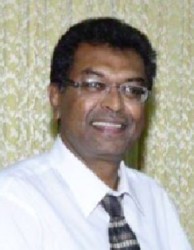In a reply to businessman, Dr Yesu Persaud, the AFC has defended the linking of the anti-money laundering bill to the setting up of the procurement commission and the convening of local government polls.
Responding yesterday to a letter that Persaud had written to the government and the opposition on Friday calling for the urgent passage of the Anti-Money Laundering/ Coun-tering the Financing of Terrorism (AML/CFT) (Amendment) Bill, AFC Leader Khemraj Ramjattan also laced into the government for dithering on the crucial amendments for years.


The Alliance for Change (AFC) Leader also blasted the government for first arguing that opposition amendments to the AML/CFT bill would make it non-compliant with international standards and then tendering amendments of their own.
Ramjattan also recalled Persaud’s association with the campaign for free and fair elections pre-1992 and said the matters being fought for by the opposition were matters that he had championed in his “long and distinguished career”.
The AFC’s reply to Persaud suggests that the government will have a hard time getting the bill passed without conceding amendments. A Partnership for National Unity (APNU) which has tabled several amendments to the AML/CFT bill has also said it will not back away from the issues it wants the government to address.
Persaud’s letter to President Donald Ramotar, Opposition Leader David Granger and Ramjattan had warned of the repercussions to the country of not swiftly passing the bill and had also cautioned against linking the bill to other matters.
“…the amendment required to be passed for the Anti-Money Laundering/Countering the Financing of Terrorism (AML/CFT) Act should not be tied or made conditional on any other local political objective being accomplished”, Persaud said. He had also floated his own amendments for consideration by all sides.
In his reply yesterday, Ramjattan said that when the government belatedly tabled a bill in May of 2013 to amend some technical provisions of the Act, submissions made by bodies and individuals had pointed out that unconstitutional elements of the principal act were not addressed. Neither were the conflict of interest provisions which conferred enforcement powers on the Attorney General and the Minister of Finance though they themselves were also subject to the Act as politically exposed persons. In addition, the bill contained no provisions for the independent supervision of the Financial Intelligence Unit (FIU), the node for addressing money laundering suspicions.
“As a member of the Select Committee to which the National Assembly referred the matter, I can tell you that these submissions from bodies and individuals came with recommendations and were favourably received by the Select Committee. APNU made several recommendations for amendments, and though there were delays as to the actual formulation, the AFC, after seeing them when they were recently brought, found them to be legitimate and credible. The Select Committee asked that these be drafted in legal language and we were then told that the AG’s Chambers needed time to draft these proposals as they were indeed technical matters and care was needed to avoid hazardous consequential implications”, Ramjattan said in his reply to Persaud.
Ramjattan noted that the Chief Parliamentary Counsel did complete drafting APNU’s amendments for the last meeting of the parliamentary select committee on March 12th, 2014 and “most surprisingly” at the behest of the Attorney General he also completed a counter-draft for the government. Ramjattan said that both drafts were taken to the select committee and he thought that some of the matters of the counter-draft were not without merit.
“What is significant to deduce from this development of a counter-draft from Government is, firstly, that all the talk especially from the President, the Finance Minister and the Attorney General that any amendment to the original Bill was going to be CFATF non-compliant, have been riven asunder. Secondly, and more positively, that there now appears at this stage to be some room for compromise if only to the extent of these amendments. I surely hope that it will extend further”, Ramjattan said.
The AFC Leader said that he felt that consideration of the drafts would have been fast-tracked, but the government requested through its representative who currently chairs the AML/CFT Select Committee, a date for continuation on 25th March, 2014 because of overseas and other commitments by Government members.
Ramjattan further argued that the Govern-ment is wasting taxpayers’ money to “distort the facts on this AML/CFT issue; unjustifiably accusing the Opposition of unpatriotism; and, to solicit lobbying-letters from persons who are not as informed as you are. Not only will that money be saved, but the process can be advanced in an atmosphere far more conducive to a resolution.”
Ramjattan said that while he welcomed Persaud’s letter he regretted that Persaud did not advise the Government to return speedily to the Select Committee of Parliament and to follow the calls by informed and patriotic citizens for money laundering legislation that is strong and will have the required teeth to stamp out money laundering and terrorism in Guyana.
“I suggest that it is not too late for you to do so and I and my AFC team are prepared to meet and share with you the AFC’s road-map on the matter, which road-map will lead to a win-win-win situation for PPP, APNU and the AFC. And, of course, all Guyana!” Ramjattan as-serted.
The AFC leader said he had no doubt that Persaud is as concerned as the party that the government has not operationalised the constitutionally mandated Public Procurement Com-mission for 12 years.
“And as you must be aware, corruption has run riot in matters procurement because of its non-operationalisation during that time”, Ramjattan added. The AFC leader also cited the absence of local government elections.
“And so if I may be permitted to ask: Why then at the very minimum should these two matters of the highest constitutional importance not be tagged to the passage of the AML/CFTA?”, the AFC Leader asked.
He pointed too to several bills that the President has refused to assent to on the “spurious grounds” that they are unconstitutional. He also stated that the Ramotar Administration has not acted on the Integrity Commission and to execute a parliamentary decision with respect to government holding company, NICIL for operating outside of the Constitution and good governance.
“All these matters and much more you have championed in your long and distinguished career. I am aware of your courage as Chairman of GUARD to campaign for free and fair elections at the national and local government levels during the Hoyte Presidency. I am aware of your fearlessness in speaking out against the discriminatory grant of tax-holidays to a certain Government favourite, and against corruption, among a number of other public matters of national importance”, Ramjattan said.
Earlier in his letter, Ramjattan adverted to the history of anti-money laundering legislation with the intention of showing that the government had not been serious about it. Legislation was first introduced as Bill No 10 of 1998, approved by the National Assembly and assented to by then President Bharrat Jagdeo in March 29th 2000. Ramjattan noted that the 2000 Act was the subject of critical reviews particularly post 9/11 but it was only on June 4, 2007, the Government introduced the Anti-Money Laundering and Countering the Financing of Terrorism Bill.
“After nearly two years and fifteen sittings of a Select Committee the National Assembly on April 30, 2009 passed the Bill. Reinforcing the perception that the PPP administration was never serious about pursuing crime and its proceeds, then President Jagdeo, who headed that administration, took one hundred and seven days before he assented to the Bill on August 14, 2009. He took a further 87 days before bringing the 2009 Act into force. You will agree that this hardly reflects any seriousness on the part of the PPP Government”, Ramjattan argued.
The AFC leader said that for nearly four years and despite failing grades in periodic evaluations, very little was done by the FIU or its politically-appointed head, Paul Geer, to advance the purposes of the Act.
He said that President Ramotar, upon taking office in 2011, continued to disregard the bi-annual evaluation reports by the Caribbean Financial Action Task Force (CFATF) until May last year when CFATF’s patience ran out and it threatened Guyana with blacklisting, triggering the present campaign for updated legislation.




